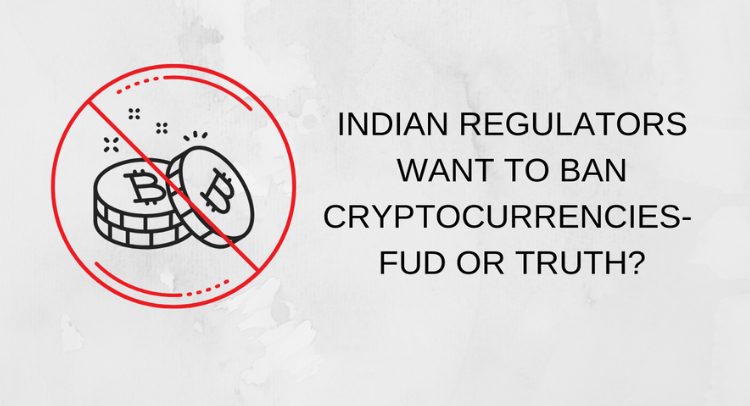Latest news about Bitcoin and all cryptocurrencies. Your daily crypto news habit.
 Source: Indian regulators seek complete ban on cryptocurrencies: Economic Times
Source: Indian regulators seek complete ban on cryptocurrencies: Economic Times
The Indian regulators may be planning to propose a new bill to the government which recommends a blanket ban on cryptocurrencies. Indian mainstream media outlet Economic Times reported that the government has already kicked off inter-ministerial consultations on a draft bill to ban cryptocurrencies.
Called the ‘Banning of Cryptocurrencies and Regulation of Official Digital Currencies Bill 2019’, the draft bill has been circulated among the key government departments which include the Department of Economic Affairs (DEA), Central Board of Direct Taxes (CBDT), Central Board of Indirect Taxes and Customs (CBIC) and the Investor Education and Protection Fund Authority (IEPFA).
According to the report, the four government departments are in favour of a blanket ban on sale, purchase and issuance of cryptocurrencies. Based on the feedback from these departments, the bill will be proposed to the new government after the elections.
The committee has also pointed out the risks associated with money laundering and proposed that the ban can be achieved under the Prevention of Money Laundering Act. In addition, the regulators have also pointed out at the multitude of scams that are being run in the space fleecing gullible investors with promises of huge returns.
The Hindu Business Line mentions that it was the IEPFA that wrote to the Department of Financial Services under the Ministry of Finance recommending a ban on cryptocurrencies.
Mainstream Media FUD again?
Mainstream media FUD is nothing new. Even in the past, the Economic Times and several other media outlets have written about cryptocurrencies but none of their reports have ever come true. If we look at the Economic Times report closely, there are a few inconsistencies:
- The report talks about ‘Regulation of Official Digital Currencies’. This presumably refers to a state-backed cryptocurrency. When the Indian regulators have not shown enough understanding of cryptocurrencies, can we really expect them to launch a cryptocurrency? And if they do not like the idea of cryptocurrencies, why launch an official one in the first place
- The report points to money laundering and dubious ponzi schemes as one of the key reasons to advocate the ban. Doesn’t the Indian government realise that it is the lack of cryptocurrency regulations that is exposing the industry to such problems? If the government allowed cryptocurrency exchanges following KYC and AML procedures to run their operations smoothly, would such problems even arise? If the government implements a blanket ban, a parallel economy will be created making it more difficult for the government to track cryptocurrencies.
- The report says “…sale purchase and issuance of cryptocurrencies such as Bitcoin, Ethereum & CashCoin etc.” The report has clubbed Bitcoin and Ethereum with an unknown coin named CashCoin. This clearly indicates the level of understanding the mainstream media has about cryptocurrencies.
- And finally, the report relies on ‘sources’. Can we really believe in unknown sources yet again?
India’s Progress on Cryptocurrency Regulation
A recent article on Bitcoin.com revealed that the Ministry of Finance recently published a summary report where various departments were consulted with regards to all aspects of cryptocurrencies. The report says that various options for treating cryptocurrencies are being examined by the committee.
It is possible that the Economic Times article is once again a classic case of media FUD. All eyes are now on July 23rd when the next hearing of the RBI vs cryptocurrency matter takes place in the Supreme Court.
India Considering Blanket Ban on Cryptocurrencies? was originally published in Hacker Noon on Medium, where people are continuing the conversation by highlighting and responding to this story.
Disclaimer
The views and opinions expressed in this article are solely those of the authors and do not reflect the views of Bitcoin Insider. Every investment and trading move involves risk - this is especially true for cryptocurrencies given their volatility. We strongly advise our readers to conduct their own research when making a decision.